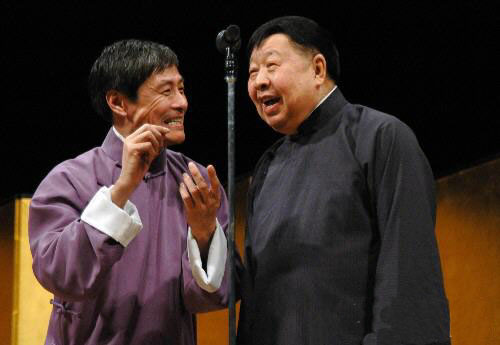| Tools: Save | Print | E-mail | Most Read |
| Crosstalk, to Change or Not? |
| Adjust font size: |
Laughter is undoubtedly an expression of happiness. There is even scientific evidence that laughing is good for your health. Crosstalk, or xiangsheng, a traditional art form between two performers conveying sarcasm through funny stories, is known as the "art of laughter." A lack of excellent crosstalk works and its degeneration from the art of sarcasm to a vulgar form of pranks and self-deprecation have been a topic for many who worry about the future of this traditional folk art. The death of veteran crosstalk artist Ma Ji has again touched off heated discussion about the fate of this art form. Some take it for granted that it is natural for this traditional art to lose its appeal to a modern audience that has a much wider array of entertainment choices available. The popularization of the Internet has provided people with far more channels for fun.
Late crosstalk master Ma Ji (right) and young crosstalk artist Liu Wei perform at a show in Tokyo, Japan, April 2006. Some blame TV, arguing that crosstalk performers have had to change their traditional way of gradually developing a story, culminating with a final punch line. In front of the TV cameras they must make viewers laugh continuously. As a result, most crosstalk pieces do not provoke many laughs at all. There may be some truth in the above arguments. But the fact that many crosstalk fans, even some youngsters, listen to recorded crosstalk pieces by well-known artists suggests that many still love this art form. These days they are not as enthusiastic as they were to watch and listen to crosstalk shows because the modern versions are not as good as they used to be. As some have pointed out, the absence of humor and sarcasm, which are the essence of this art form, is the main problem. Good crosstalk pieces need humor and sarcasm and must be sharp in their criticism of social evils. A good script needs to be an accumulation of what the writer has obtained from both his own observations of life and those of others. The old masters wrote their own scripts. Now very few crosstalk performers write scripts of their own. They depend on scriptwriters for their performances. Whatever the reason, they do not have to think hard about their lines when they do not have to write them themselves. Although they are not as good as their predecessors, today's performers make much more money by appearing on TV shows. As a result, they have no pressure and no need to worry about whether their performance can raise a laugh. (CRI.com December 28, 2006) |
| Tools: Save | Print | E-mail | Most Read |
 |
| Related Stories |
|
